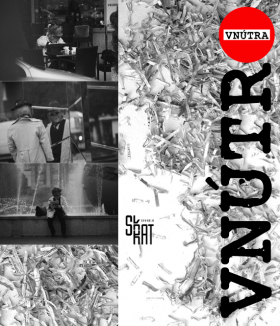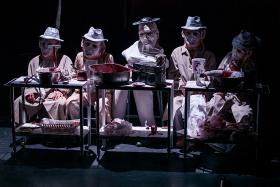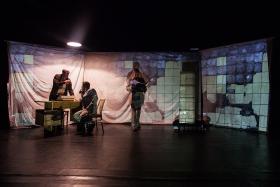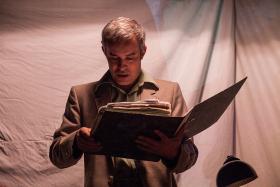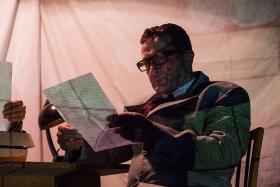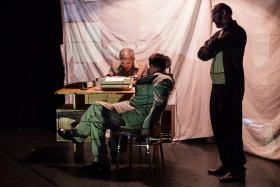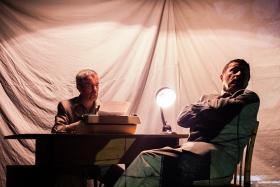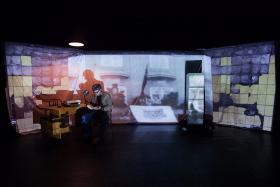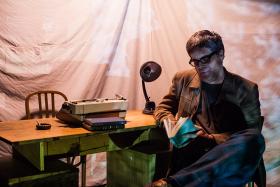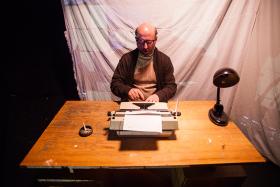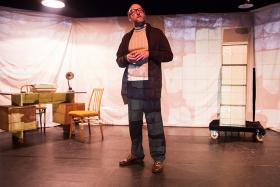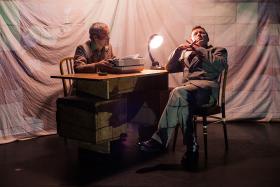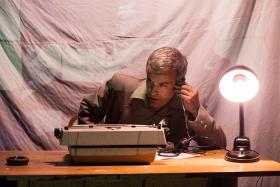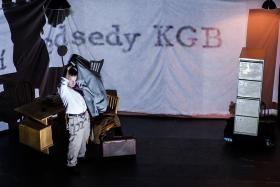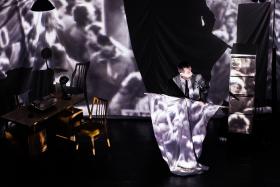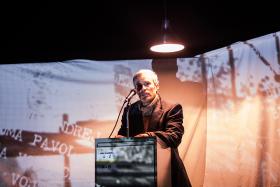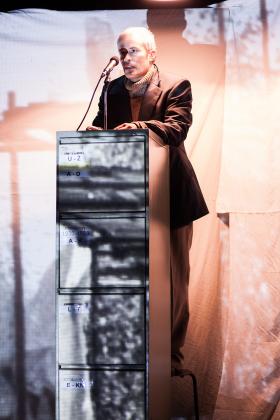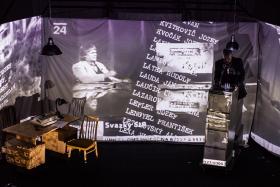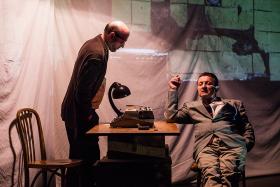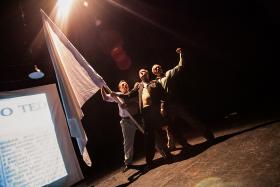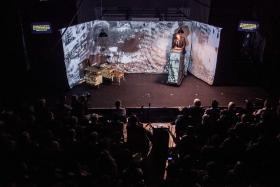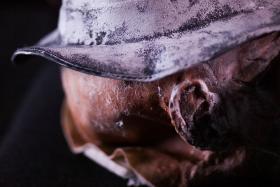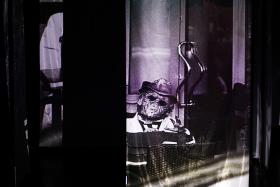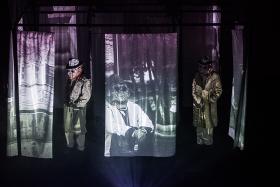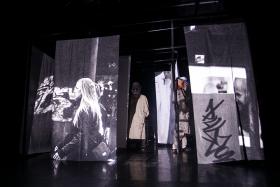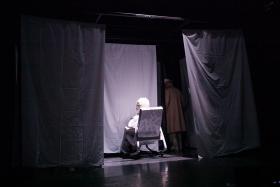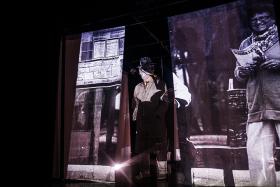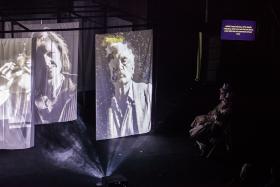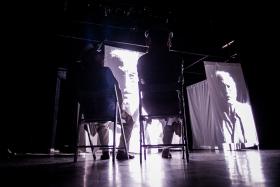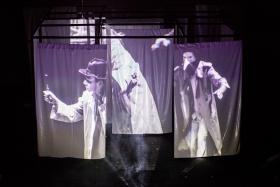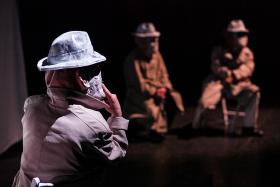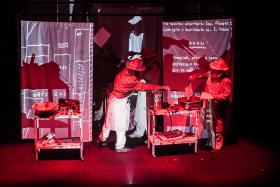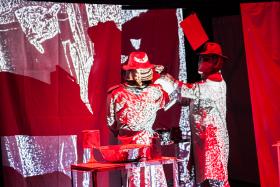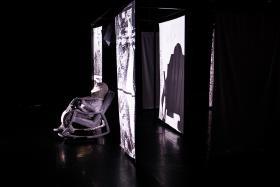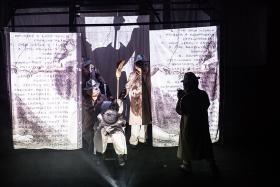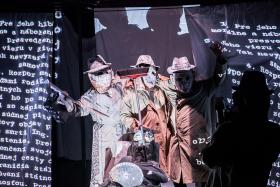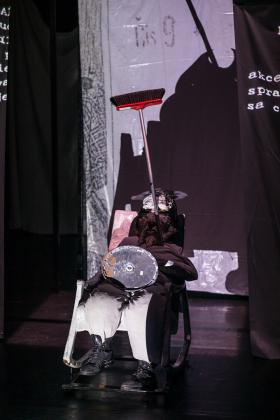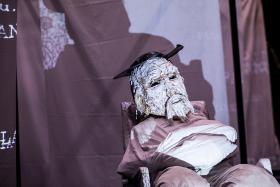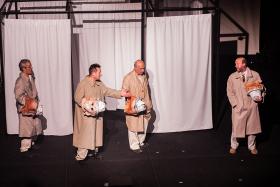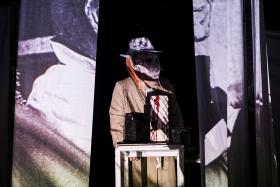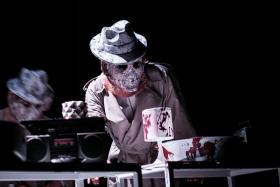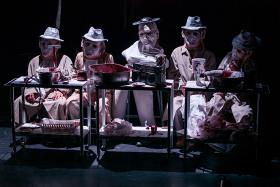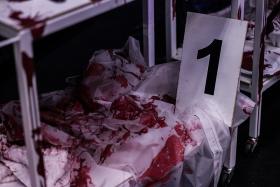First Part: Inside of the Inside
Concept, script, direction Ľubo Burgr
Visual cooperation Boris Vitázek
Applied music F. K. Veselý, J. Blaho: Ej chlapci z pod Tatier; W. A. Mozart: A Little Night Music; J. Brabec, P. Rada: Modlitba pro Martu
Applied film materials: Budujeme socializmus 1948, Novotný...; interview with Petr Cibulka, ČT24
Applied literature - passages from the book Zdeněk Mlynář: Mráz přichází z Kremlu; from the defence of Václav Havel; from the blog of Zuzana Roy
Soundmix Ľubo Burgr
Technical cooperation Martin Kokavec
Cast Vít Bednárik, Milan Chalmovský, Dušan Vicen, Vlado Zboroň
Voice of the blogger Ingrid Hrubaničová
Second Part: Paranoia Querulans
About the murders, suicides, various violence, but also about the kidnapping and torture in Czechoslovakia and what is the stance of the authorities The Ministry of Interior and The Public Prosecution on these matters
Concept, script, direction Dušan Vicen
Set design Milan Mikula
Masks Natalia Kida
Visual cooperation Boris Vitázek
Applied music Murcof: Oort, Moon Ate the Dark: Messy Hearts, Explosions In a Four Chambered Heart, Capsules 11
Sound mix Ľubo Burgr, Dušan Vicen, Boris Vitázek
Technical cooperation Martin Kokavec
Characters in the projections František Kovár, Jana Oľhová, Robert Roth
Dancers in the projections Stanislava Vlčeková, Daniel Raček
cast Vít Bednárik, Ľubomír Burgr, Milan Chalmovský, Vlado Zboroň
Inspired by the hitherto unclarified case of the strange death by double agent, priest Coufal in 1981, the authors of the latest production at the SkRAT Theatre are studying the mechanisms which enabled, within the secret police ŠtB, the building up of a parallel power structure and mutual checking of individual members of staff including colleagues at all levels of this organisation. Mechanisms which could be functional even after the dissolution of the ŠtB.
The death of the secretly ordained priest Rev. Ing. Přemysl Coufal is one of the most serious unclarified cases of the Slovak judiciary. It has many levels: it combines a personal tragedy, struggle for human honesty and purgation of one’s name and it is also an example of unprecedented practices by the Czechoslovak ŠtB. It also demonstrates the failure of the judiciary system of the past regime as well as that following 1989. Last but not least, it demonstrates the power the former top members of the secret police have had in Slovakia until today.
The ŠtB interfered into Přemysl Coufal’s life several times. In the 1960’s, having obtained the information about his activities in the underground church, it managed to win him over for its services for several years to provide information about the economic illegal practices of his company. Later he used numerous foreign business trips for establishing contacts and exchange of information and material with the exile and foreign church representatives. In 1979 he was identified as a courier to be forced to collaborate with the ŠtB, which he refused. On 24 February 1981 he was found dead in his flat showing traces of a brutal murder. The case was concluded by the investigation authorities of the day as a suicide. Neither the investigation of 1990, after which the case had been put aside, reached any other conclusion. By the 1992 court decree all the documents related to the case were locked in the archive safe of the SR with the date of release corresponding to the negative prescription (limitation of time beyond which the possible criminal acts related to the case are no longer enforceable). The time limit is still running.
There have been several unsuccessful initiatives to purge the name of Přemysl Coufal, which neither his parents lived to see, especially trying to achieve the annulment of the official investigation conclusion version classifying it as a suicide. In connection with Coufal’s case the disappearance of the journalist Marcel Samuhel is also talked about who had informed about the case in the early 1990’s – at a time when several journalists writing about serious issues disappeared in Slovakia. The personal story of Přemysl Coufal opens many ethical issues – at a time when ethics is considered an empty word and helplessness against non-transparent power mechanisms is cured by cynicism – it is a demonstration of responsibility for the sound functioning of society carried not only by brave individuals but mainly the legislative and judiciary bodies. It also shows how far reaching consequences complicated political decisions can have, such as, for example, “the broad line” after the past which Czechoslovak politicians had done following 1989. On the one hand, it was a gesture of moral noble-mindedness and period-conditioned optimism by the political elite of the day, on the other one, it showed its deadly romanticism and political ignorance the fatal consequences of which we are suffering until today.
In the production The Inside of the Inside the authors, Ľubomír Burgr and Dušan Vicen, are covering several stages of the ŠtB operation. The grotesque analysis of “evaluations” that the members of ŠtB at all levels were writing on themselves offers an opportunity to look into the mechanisms of building up a parallel power structure within the ŠtB thus enabling mutual inspection of individual members of staff and collaborators at all levels of this organisation, mechanisms that might be operational even after the dissolvement of the ŠtB. Another important motif in the production is the story of the ups and downs of prominent party officials, such as Zdeněk Mlynář, author of the thrilling book Frost comes from Kremlin. Thanks to this we can look into the unrestrained inside of power which, unless harnessed by law or morality, can engulf everything around it, including itself, as in the archetypal picture where the devouring starts from the tail. In their production Burgr and Vicen are dealing with stories affected by the ŠtB in recent past but also significant issues which resulted from its activities following the fall of the totalitarian regime. What is of key importance, then, is the investigation of our coming to terms with the heritage of the totalitarian past.
Ján Šimko
Premiere: September 29th 2013, Divadelná Nitra
Length: 45 + 45 min. + 10 min. break

 In co-production with the International Theatre Festival Divadelná Nitra, in the framework of the project "Parallel Lives - 20th Century through the Eyes of Secret Police". This project has been funded with support from the European Commission.
In co-production with the International Theatre Festival Divadelná Nitra, in the framework of the project "Parallel Lives - 20th Century through the Eyes of Secret Police". This project has been funded with support from the European Commission.
Supported by Ministry of Culture of the Slovak Republic and Polish Institute Bratislava.
FESTIVALS AND VENUES
Divadelná Nitra 2013
Víkend atraktívneho divadla 2013, Zvolen
HaDivadlo, Brno, Czech Republic, November 13th, 2013
National Theatre Prague, Czech Republic, October 5th, 2014
Festiwal Parallel Lives, Cracow, Poland, April 18th, 2015
Teatr Ad Spectatores, Wrocław, Poland, April 19th, 2015
REVIEWS
